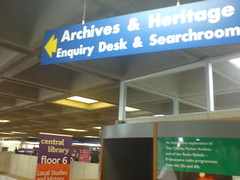Birmingham Archives and Heritage Service
this building is doomed to be abandoned after 2013
Birmingham Archives and Heritage Service:
"Birmingham Archives and Heritage Service is a fusion of Birmingham City Archives and the former
Local Studies and History service. We now offer improved access to archival material and resources
for researching local and family history on Floor 6 of Birmingham Central Library."

Archives and Local Studies services – major changes: "The new service will be known as the Birmingham Archives and Heritage Service and will be focussed more on providing access to Archives and Local Studies collections and less on providing a general history reference service"
New counter
We have built a new counter for combined service at the far end of floor 6 where the microfilm readers and genealogy desk used to be. The main counter and open access research area of the new service are open the same hours as the Central Library, that is:
- Monday to Friday 9-8
- Saturday 9-5
A new secure serving area is now located next to the counter for archives and other unique and rare collections.

This is accessible to all for the first time with no need to use the spiral staircase to gain access to Archives. Archive material and some rare and unique material from Local Studies will be served in this area which have slightly extended hours compared to the previous Archives search room. The new hours are given below and will come into operation from February 2008:
- Monday closed
- Tuesday, Wednesday, Friday 10-6
- Thursday 10-8
- Saturday 10-5
see my Slideshow



